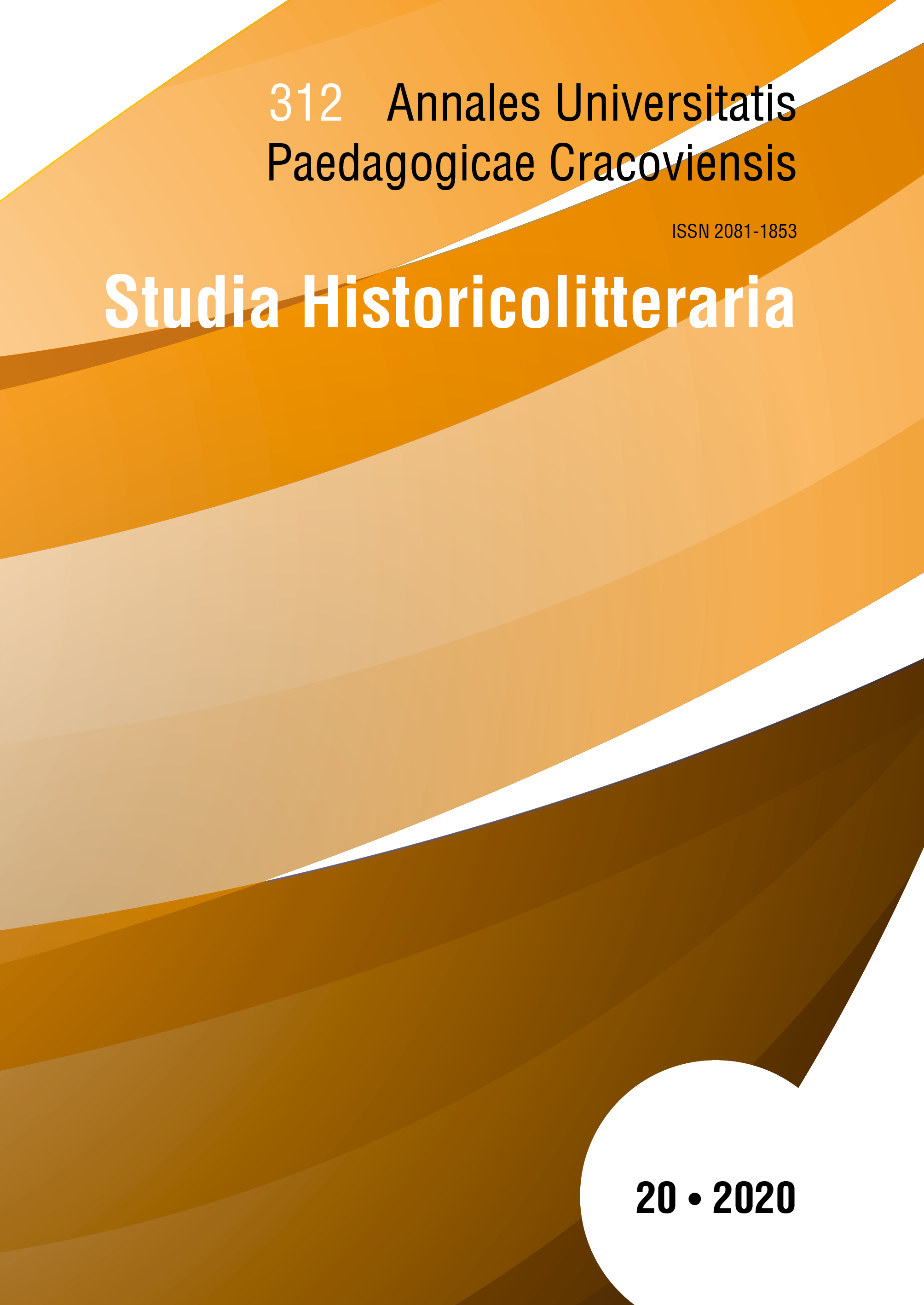Literariness of sermons by Reverend Janusz Stanisław Pasierb
Main Article Content
Abstract
Sermons of Reverend Janusz Stanisław Pasierb have a distinct literary character. This may be due to the fact that the preacher was both a poet and essayist. The first part of the paper contains a methodological reflection on literariness, with particular emphasis on the location of the sermon as a specific genre of expression in relation to other forms of literary expression. In the further part of the text, the style and composition of sermons of Reverend Pasierb and their relationship with the poetry of this author are examined. Also, homilies from the funerals of art people are presented - in these works Pasierb contained a particularly large literary component. Reverend Pasierb is fully aware of what the art of word is, including the preacher’s word. He works towards a greater linguistic reflection, drawing artistic attention to the style of preaching. His preaching, with a metaphysical depth and clearly eschatological perspective, and at the same time adding value to worldliness, often tends to an essay and meditation. We are dealing with the individualization of a preacher’s message and a partial remodelling of a typical preacher’s formula.
Downloads
Article Details

This work is licensed under a Creative Commons Attribution-NonCommercial-NoDerivatives 4.0 International License.
COPYRIGHT POLICY
The publisher of "Annales Universitatis Paedagogicae Cracoviensis.Studia Historicolitteraria" is authorised to use and distribute all the materials published in the journal on the basis of a non-exclusive licence agreement unlimited in time – previously concluded for an indefinite period of time each time with the author of a specific paper in the fields of exploitation specified in the agreement.
OPEN ACCESS POLICY
"Annales Universitatis Paedagogicae Cracoviensis.Studia Historicolitteraria” is an open access journal, and all its contents are available for free to users and/or their institutions on the basis of non-exclusive licenses under Creative Commons (CC BY CC-BY-4.0). Users can read, download, make copies, distribute, print, search, or to link to full text articles in this journal without the prior permission of the publisher or the author.This is consistent with the definition of open access BOAI (http://www.soros.org/openaccess).
References
Arystoteles, Retoryka. Poetyka, przeł. H. Podbielski, Warszawa 1988.
Balbus S., Zagłada gatunków, [w:] Genologia dzisiaj, red. W. Bolecki i I. Opacki, Warszawa 2000, s. 8–31 (Z Dziejów Form Artystycznych w Literaturze Polskiej, t. 82).
Culler J., Teoria literatury, przeł. M. Bassaj, Warszawa 2002.
Dąbrowski S., Literatura i literackość, Kraków 1977.
Głosy Herberta, oprac. B. Toruńczyk, Warszawa 2008.
Gołaszewska M., Kim jest artysta?, Warszawa 1986.
Herbert Z., Rovigo, wyd. 2, Wrocław 1997.
Koprowski P., „Służę słowu”. Janusz Pasierb o języku religijnym”, „Język – Szkoła – Religia” 2011, nr 6, s. 210–220.
Kostkiewiczowa T., Literackość, [w:] Słownik terminów literackich, red. J. Sławiński, Wrocław 1988, s. 258–260.
Pasierb J.S., Czas otwarty, Poznań 1972.
Pasierb J.S., Eschatyczna perspektywa kultury, [w:] W kierunku człowieka, red. B. Bejze, Warszawa 1971, s. 322–349.
Pasierb J.S., Gałęzie i liście, Poznań 1985.
Pasierb J.S., Miasto na górze, Kraków 1973.
Pasierb J.S., Po walce z aniołem, Warszawa 1996.
Pasierb J.S., Skrzyżowanie dróg, Poznań 1989.
Pasierb J.S., Słowo Boże między ludźmi, wybór i oprac. M. Wilczek, Katowice 2010.
Pasierb J.S., Światło i sól, Paryż 1982.
Przybylski R., Poezja wiary tragicznej, [posłowie do:] J.S. Pasierb, Wiersze wybrane, Warszawa 1988, s. 377–389.
Sikora J., Od Słowa do słowa. Literackość współczesnych kazań, Warszawa 2008.
Sikora J., Twórczość kaznodziejska ks. Józefa Tischnera, Warszawa 2012.
Sikora J., Współczesne kazanie wobec literackości, „Przegląd Homiletyczny” 2010, t. 14, s. 175–184.
Simon H., Homiletyka, [w:] Encyklopedia katolicka, t. 6, red. J. Walkusz i in., Lublin 1993, s. 1175–1179.
Skwarczyńska S., Przedmiot, metoda i zadania teorii literatury, „Pamiętnik Literacki” 1938, z. 1, s. 7–22.
Stoff A., Kiedy literatura zdradza człowieka?, „Ethos” 2004, nr 1–2, s. 293–313.
Szymik J., Cisza i słowo. O kazaniach ks. Pasierba, https://www.gosc.pl/doc/1681576.Cisza‑i‑Slowo (dostęp: 18.03.2020).
Wilk W., Kulturowe uwarunkowania głoszenia słowa Bożego, [w:] Wybrane aspekty komunikacji kaznodziejskiej, red. J. Twardy, W. Broński i J. Nowak, Kielce 2005, s. 24–38.
